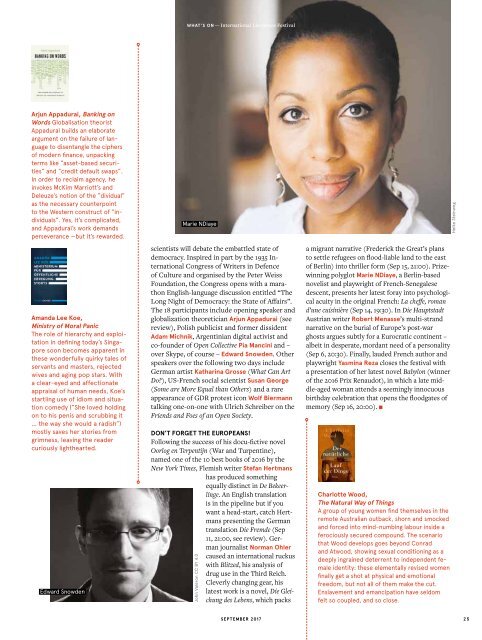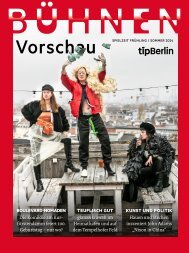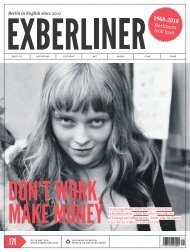EXBERLINER Issue 163, September 2017
Create successful ePaper yourself
Turn your PDF publications into a flip-book with our unique Google optimized e-Paper software.
WHAT’S ON — International Literature Festival<br />
Arjun Appadurai, Banking on<br />
Words Globalisation theorist<br />
Appadurai builds an elaborate<br />
argument on the failure of language<br />
to disentangle the ciphers<br />
of modern finance, unpacking<br />
terms like “asset-based securities”<br />
and “credit default swaps”.<br />
In order to reclaim agency, he<br />
invokes McKim Marriott’s and<br />
Deleuze’s notion of the “dividual”<br />
as the necessary counterpoint<br />
to the Western construct of “individuals”.<br />
Yes, it’s complicated,<br />
and Appadurai’s work demands<br />
perseverance —but it’s rewarded.<br />
Amanda Lee Koe,<br />
Ministry of Moral Panic<br />
The role of hierarchy and exploitation<br />
in defining today’s Singapore<br />
soon becomes apparent in<br />
these wonderfully quirky tales of<br />
servants and masters, rejected<br />
wives and aging pop stars. With<br />
a clear-eyed and affectionate<br />
appraisal of human needs, Koe’s<br />
startling use of idiom and situation<br />
comedy (“She loved holding<br />
on to his penis and scrubbing it<br />
… the way she would a radish”)<br />
mostly saves her stories from<br />
grimness, leaving the reader<br />
curiously lighthearted.<br />
Edward Snowden<br />
Marie NDiaye<br />
scientists will debate the embattled state of<br />
democracy. Inspired in part by the 1935 International<br />
Congress of Writers in Defence<br />
of Culture and organised by the Peter Weiss<br />
Foundation, the Congress opens with a marathon<br />
English-language discussion entitled “The<br />
Long Night of Democracy: the State of Affairs”.<br />
The 18 participants include opening speaker and<br />
globalization theoretician Arjun Appadurai (see<br />
review), Polish publicist and former dissident<br />
Adam Michnik, Argentinian digital activist and<br />
co-founder of Open Collective Pia Mancini and –<br />
over Skype, of course – Edward Snowden. Other<br />
speakers over the following two days include<br />
German artist Katharina Grosse (What Can Art<br />
Do?), US-French social scientist Susan George<br />
(Some are More Equal than Others) and a rare<br />
appearance of GDR protest icon Wolf Biermann<br />
talking one-on-one with Ulrich Schreiber on the<br />
Friends and Foes of an Open Society.<br />
DON’T FORGET THE EUROPEANS!<br />
Following the success of his docu-fictive novel<br />
Oorlog en Terpentijn (War and Turpentine),<br />
named one of the 10 best books of 2016 by the<br />
New York Times, Flemish writer Stefan Hertmans<br />
has produced something<br />
equally distinct in De Bekeerlinge.<br />
An English translation<br />
is in the pipeline but if you<br />
want a head-start, catch Hertmans<br />
presenting the German<br />
translation Die Fremde (Sep<br />
11, 21:00, see review). German<br />
journalist Norman Ohler<br />
caused an international ruckus<br />
with Blitzed, his analysis of<br />
drug use in the Third Reich.<br />
Cleverly changing gear, his<br />
latest work is a novel, Die Gleichung<br />
des Lebens, which packs<br />
John Valeron CC BY 4.0<br />
a migrant narrative (Frederick the Great’s plans<br />
to settle refugees on flood-liable land to the east<br />
of Berlin) into thriller form (Sep 15, 21:00). Prizewinning<br />
polyglot Marie NDiaye, a Berlin-based<br />
novelist and playwright of French-Senegalese<br />
descent, presents her latest foray into psychological<br />
acuity in the original French: La cheffe, roman<br />
d’une cuisinière (Sep 14, 19:30). In Die Hauptstadt<br />
Austrian writer Robert Menasse’s multi-strand<br />
narrative on the burial of Europe’s post-war<br />
ghosts argues subtly for a Eurocratic continent –<br />
albeit in desperate, mordant need of a personality<br />
(Sep 6, 20:30). Finally, lauded French author and<br />
playwright Yasmina Reza closes the festival with<br />
a presentation of her latest novel Babylon (winner<br />
of the 2016 Prix Renaudot), in which a late middle-aged<br />
woman attends a seemingly innocuous<br />
birthday celebration that opens the floodgates of<br />
memory (Sep 16, 20:00). n<br />
Charlotte Wood,<br />
The Natural Way of Things<br />
A group of young women find themselves in the<br />
remote Australian outback, shorn and smocked<br />
and forced into mind-numbing labour inside a<br />
ferociously secured compound. The scenario<br />
that Wood develops goes beyond Conrad<br />
and Atwood, showing sexual conditioning as a<br />
deeply ingrained deterrent to independent female<br />
identity: these elementally revised women<br />
finally get a shot at physical and emotional<br />
freedom, but not all of them make the cut.<br />
Enslavement and emancipation have seldom<br />
felt so coupled, and so close.<br />
Heike Steinweg<br />
SEPTEMBER <strong>2017</strong> 25


















